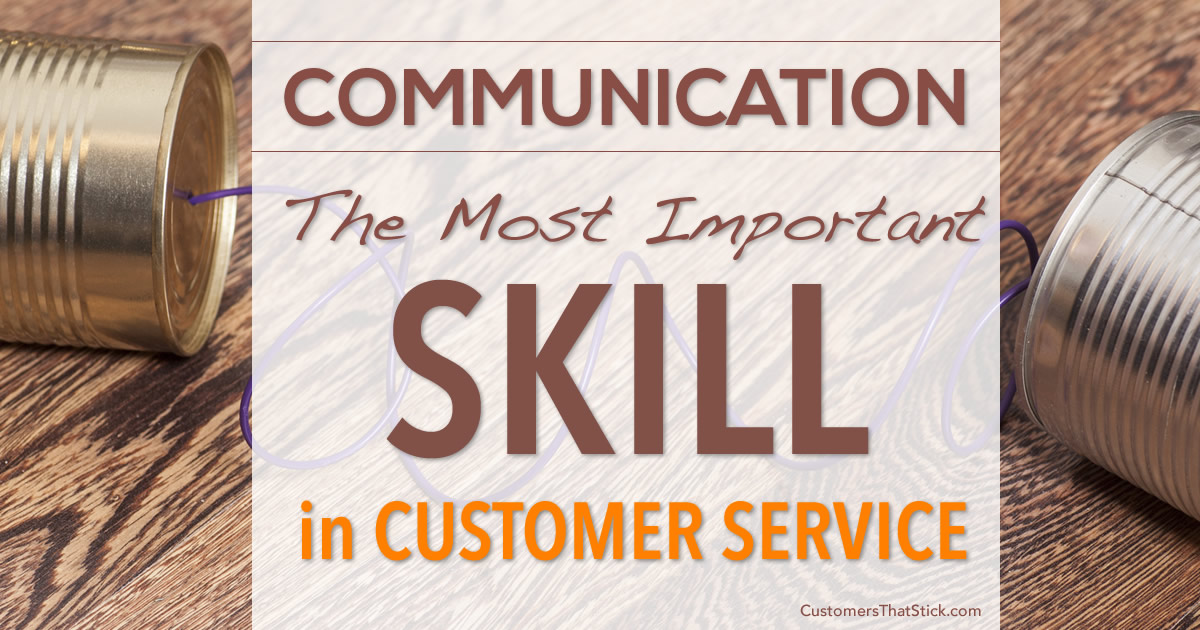
Frontline reps require a wide range of customer service skills if they are going to deliver Hero-ClassTM customer service.
Like a father with his children, I don’t like to play favorites, but at some point, I must acknowledge that one skill is more important than all of the others.
That skill is communication.
Powerful, effective communication is foundational; without it, few other aspects of a customer’s experience will matter. Communication is the glue that keeps customer experiences from falling apart.
Communication is the glue that keeps customer experiences from falling apart.
Communication is integral to every customer experience. Even something that seems noncommunication-centered, like an online order, has many layers of communication attached to it. From the language on the website to the confirmation message at checkout to the email that is sent once the order is placed, communication plays a crucial role in even an automated experience such as this one.
Communication is at the heart of the organization’s relationship with itself, with it’s external stakeholders, and, of course, with it’s customers. At the organizational level, communication is a strategic imperative that should be aligned with goals and, whenever possible, carefully crafted to produce maximum impact.
On the front lines, it is a skill that must be trained and mastered.
As I wrote in Be Your Customer’s Hero, great customer communication may start with the lessons Grandma taught you — please, thank you, sir, ma’am and the like — but they do not end there.
Good communication skills include an understanding of psychology and how to deliver the right message at the right time. They include the ability to ask effective questions, to deescalate anger, and to reassure without the ability to actually assure results.
When working with teams on communication skills, it is important to focus on their ability to deliver communication that sets a positive tone and that helps prevent common service triggers from being pulled.
Furthermore, it is crucial that frontline reps understand how to interpret the communication of others.
They need to understand how to read body language, how to process tone, and how to get to the meaning behind the words. Often what customers say is not what they really want to say. Often customers hide their meaning, and effective communicators can see that happening and dig deeper to find out what the customer is actually trying to communicate.
Great customer communication starts when you hire the right customer service rep for the job, it accelerates when you train that rep on the communication skills they need to succeed, and it ends when… well, it never ends.
There’s virtually no limit to how much you can work on improving communication skills for your team. It is an area of focus and training which will always produce positive results.
Communication is not everything in customer experience, but it is the most important thing. Make sure your team has the tools it needs to succeed.
Comments have been closed on this post.
© 2011-2023 CTS Service Solutions, LLC.
All rights reserved.
Legal Information | Privacy Policy
How to Cite this Site
You make an excellent point about the importance of communication!
I wonder if your experience is the same or different than mine? Many customer service professionals & leaders talk about the importance of good communication, but consistently underestimate how difficult it can be.
Communication, like any skill, must be practiced. And, as you wrote, there are many aspects to good communication!
Pingback: 217: Jill Schiefelbein, Dynamic Communication
Pingback: 234: Tips for Customer Service Bots
Pingback: 271: Take It To the Top – Tesla’s New Strategy
Pingback: 306: Eric Porres, Personalized Video Experience
Pingback: 308: Jacob Morgan, The Future of Work
I do believe Good Customer service is important in all Orangizations,if a strong relationship is established with the customer through effective communication the business will last long.Communication is one keen way, through which we can understand the need of the customer either by letter, email, phone call or in person.
Effective customer service communication combines a personalized approach with efficient practices that save customers time and frustration while ultimately winning their loyalty. This has to includes the ability to ask effective questions, to deescalate anger, and to reassure without the ability to actually assure results.
Great comment Ren!
Yes Communication is the key of customer service. Whatever problem it is with easy communication we can solve easily.
It is very informative
Great Customer Service is what males me happy on the other end of the phone call.
Makes or breaks business for me.
I agree with this information on good communication with the public.
Excellent information on being your best to represent your company and yourself. It basically comes down to treating everyone the way you would want to be treated.
Great customer service is essential.No one likes to be ignored ,disrespected or to have their concerns gone over with a minimal of concern. Be results driven in your customer service role.